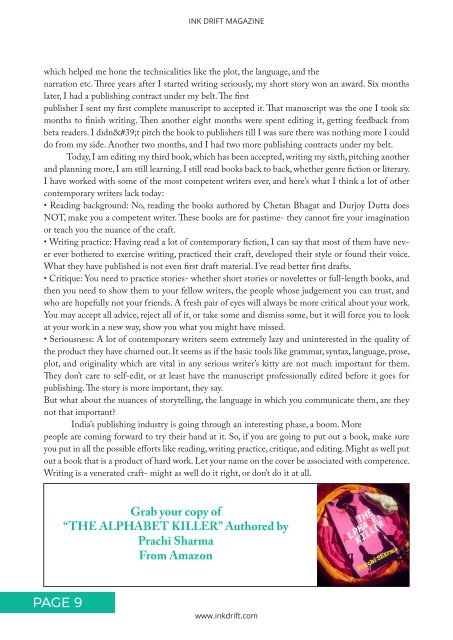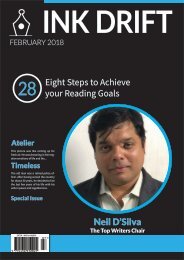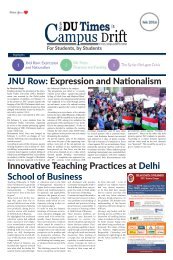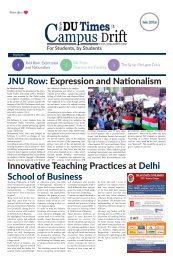September Issue - On Writing
Themed on writing featuring authors from all over the world.
Themed on writing featuring authors from all over the world.
Create successful ePaper yourself
Turn your PDF publications into a flip-book with our unique Google optimized e-Paper software.
INK DRIFT MAGAZINE<br />
which helped me hone the technicalities like the plot, the language, and the<br />
narration etc. Three years after I started writing seriously, my short story won an award. Six months<br />
later, I had a publishing contract under my belt. The first<br />
publisher I sent my first complete manuscript to accepted it. That manuscript was the one I took six<br />
months to finish writing. Then another eight months were spent editing it, getting feedback from<br />
beta readers. I didn't pitch the book to publishers till I was sure there was nothing more I could<br />
do from my side. Another two months, and I had two more publishing contracts under my belt.<br />
Today, I am editing my third book, which has been accepted, writing my sixth, pitching another<br />
and planning more, I am still learning. I still read books back to back, whether genre fiction or literary.<br />
I have worked with some of the most competent writers ever, and here’s what I think a lot of other<br />
contemporary writers lack today:<br />
• Reading background: No, reading the books authored by Chetan Bhagat and Durjoy Dutta does<br />
NOT, make you a competent writer. These books are for pastime- they cannot fire your imagination<br />
or teach you the nuance of the craft.<br />
• <strong>Writing</strong> practice: Having read a lot of contemporary fiction, I can say that most of them have never<br />
ever bothered to exercise writing, practiced their craft, developed their style or found their voice.<br />
What they have published is not even first draft material. I’ve read better first drafts.<br />
• Critique: You need to practice stories- whether short stories or novelettes or full-length books, and<br />
then you need to show them to your fellow writers, the people whose judgement you can trust, and<br />
who are hopefully not your friends. A fresh pair of eyes will always be more critical about your work.<br />
You may accept all advice, reject all of it, or take some and dismiss some, but it will force you to look<br />
at your work in a new way, show you what you might have missed.<br />
• Seriousness: A lot of contemporary writers seem extremely lazy and uninterested in the quality of<br />
the product they have churned out. It seems as if the basic tools like grammar, syntax, language, prose,<br />
plot, and originality which are vital in any serious writer’s kitty are not much important for them.<br />
They don’t care to self-edit, or at least have the manuscript professionally edited before it goes for<br />
publishing. The story is more important, they say.<br />
But what about the nuances of storytelling, the language in which you communicate them, are they<br />
not that important?<br />
India’s publishing industry is going through an interesting phase, a boom. More<br />
people are coming forward to try their hand at it. So, if you are going to put out a book, make sure<br />
you put in all the possible efforts like reading, writing practice, critique, and editing. Might as well put<br />
out a book that is a product of hard work. Let your name on the cover be associated with competence.<br />
<strong>Writing</strong> is a venerated craft- might as well do it right, or don’t do it at all.<br />
Grab your copy of<br />
“THE ALPHABET KILLER” Authored by<br />
Prachi Sharma<br />
From Amazon<br />
PAGE 9<br />
www.inkdrift.com














